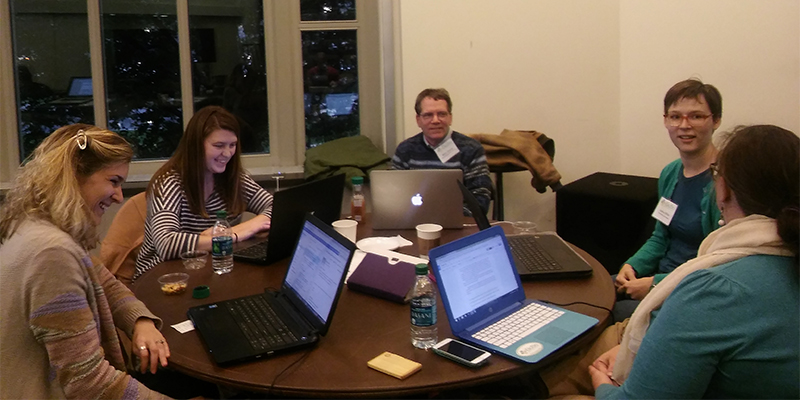Biodiversity Next 2019: vision, inspiration, action for our collective future
Deborah L Paul, Capacity Development Manager
Erica Krimmel, Digitization Resource Coordinator
Caitlin Chapman, Biodiversity Informatics Coordinator
Overview.
Deborah L Paul, Capacity Development Manager
Erica Krimmel, Digitization Resource Coordinator
Caitlin Chapman, Biodiversity Informatics Coordinator
Overview.

iDigBio has been providing professional development, resources, and community for biodiversity digitization since 2011. Each year, iDigBio hosts the ADBC Summit and organizes dozens of in-person and virtual events. The iDigBio website hosts a variety of community and internally generated content such as workflows, reports, and blog posts. iDigBio also facilitates several active email listservs and social media accounts.
Each year, the American Institute of Biological Sciences (AIBS) organizes an opportunity for scientists to inform the nation's science policy. The Biological Sciences Congressional District Visits event enables scientists to meet with their federal or state elected officials, and allows policymakers to learn first-hand about the science and research facilities in their district...
iDigBio promotes open-access to sharing data through the iDigBio portal. iDigBio’s goal is to make data for scientific specimens widely available in electronic format. iDigBio strongly urges those who submit content to do so without limitation on use or without limitation on use other than attribution.
The resources of Integrated Digitized Biocollections (“iDigBio”) are free, publicly-available, open-source computing resources and services. The purpose of this Service Level Agreement (SLA) is to define the terms of service for the website, wiki, portal, appliances, Application Programming Interface (API), Data, information, and other products and services offered by iDigBio (“iDigBio Services”). iDigBio is a program of the Florida Museum of Natural History, a unit of the University of Florida, a public body corporate of the State of Florida.
The purpose of the of iDigBio website and e-newsletter is to facilitate the dissemination of information and updates regarding the implementation of NSF grant #EF 1115210, and to inform the broader community about progress, opportunities and obstacles relevant to resource digitization related to natural history museums.
The iDigBio website and e-newsletter serves a broad readership including natural history museum curators, collections managers, technical specialists, volunteers, citizen scientists and the general public.
iDigBio’s mission requires that it be able to aggregate and distribute digital images of biological specimens, records, and other objects associated with specimens (e.g., labels and notes) generated by TCNs and other bio- and paleo-collections hosting institutions. Linked below is a document providing current iDigBio policy as well as recommendations for acquiring, processing, archiving, and distributing still, two-dimensional digital images. We recognize the importance of other image types, including three-dimensional images, and will expand this current policy through time as demand dictates.
Current version: https://www.idigbio.org/content/idigbio-image-file-format-requirements-and-recommendations-1
Version history: https://www.idigbio.org/biblio?f%5bkeyword%5d=443